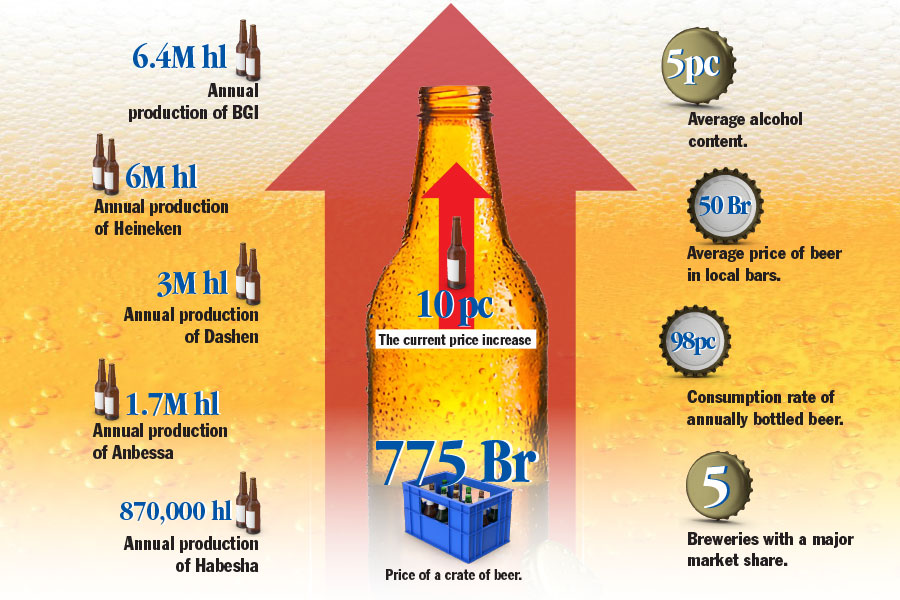
In-Picture | Aug 10,2025
Feb 24 , 2024
By Eden Sahle
During a work deployment abroad five years ago, I encountered a woman whose frailty was evident in the prominence of her facial, arm and chest bones. Unable to speak the local language, her fluency in various international languages became my lifeline, easing my stay in unfamiliar surroundings.
We worked for a different company but our shared legal background forged a quick and close connection. As our friendship blossomed, she transitioned from her apartment to reside in the same building as me. Then, I began to notice her aversion to food.
I regularly prepare meals, extending invitations to join me just a floor away. While other colleagues relished the Ethiopian and Eritrean cuisine, she consistently left her plate nearly untouched, offering excuses of an upset stomach or having consumed a large meal earlier. It was not until observant friends pointed out her peculiar behaviour with food that I realised her struggle with an eating disorder. She adamantly denied it despite evident signs of malnutrition.
Determined to help, I began experimenting with international dishes she claimed to be fond of; it did not work. My attempts at humour about the cost of untouched food only underscored the severity of her condition. Her reluctance persisted even in restaurants. Dining with her became uncomfortable as she would meticulously move her food around the plate while I emptied mine.
Repeated efforts to encourage professional help were rebuffed.
Five years later, our paths crossed again when she visited me and my newborn. Her appearance shocked me. My once youthful friend appeared significantly aged and gravely ill. Her frailty had intensified, accompanied by a steadfast denial of any issues with food. A mere sip of a soft drink seemed to sustain her.
I discovered that my friend's plight was not isolated; eating disorders had become a pervasive issue among local teenagers and concerned parents in Ethiopia.
In a culture that values organic and healthy food, eating disorders are lurking behind, particularly in teenagers. A study done in 2016 put the prevalence of eating disorders among adolescents at 8.6pc while the level of unhealthy weight control behaviours was 30.7pc in Ethiopia. Stories emerged of a 17-year-old boy drastically reducing his food intake due to weight-related teasing, and a 15-old girl hospitalised for similar reasons.
Eating disorders extend beyond unhealthy dietary habits; they are rooted in mental and emotional distress, distorted self-perceptions and critical behaviours surrounding food, weight and body image. They manifest in rigid diets, obsessive calorie counting, secretive binge eating and purging after meals. The consequences are severe; encompassing heart disease, bone loss, stunted growth, infertility and kidney damage.
The recovery journey necessitates identifying the underlying causes driving the disorder. Apart from the genetic and biological causes, certain personality traits and obsessive-compulsive tendencies can contribute to developing the disorder while dysfunctional family dynamics and overemphasis on appearance may increase the risk. Media influence that portrays body ideals leads to body dissatisfaction and the desire to attain an unrealistic body shape or weight.
Emotional and mental issues often fuel an individual's aversion to food as a means of control, coping with painful emotions, or seeking temporary solace from sadness, anger, or loneliness. Over time, these habits permeate every aspect of their lives, depriving them of self-acceptance.
In the 21st century, societal pressure to conform to accepted weight amplifies concerns about appearance and diet. Distinguishing between a healthy lifestyle and a full-blown eating disorder can be challenging for some, particularly as individuals like my friend go to great lengths to conceal their struggles. Offering help is draining but persistence may eventually lead them to seek the assistance they need.
PUBLISHED ON
Feb 24,2024 [ VOL
24 , NO
1243]

In-Picture | Aug 10,2025

View From Arada | Nov 20,2021

Radar | Jan 05,2020

My Opinion | Jan 26,2019

View From Arada | Jul 23,2022

Life Matters | Mar 25,2023

Fortune News | Mar 04,2023

Viewpoints | Feb 17,2024

Viewpoints | Jul 31,2021


Photo Gallery | 178334 Views | May 06,2019

Photo Gallery | 168535 Views | Apr 26,2019

Photo Gallery | 159322 Views | Oct 06,2021

My Opinion | 137067 Views | Aug 14,2021
Commentaries | Oct 25,2025

Dec 22 , 2024 . By TIZITA SHEWAFERAW
Charged with transforming colossal state-owned enterprises into modern and competitiv...

Aug 18 , 2024 . By AKSAH ITALO
Although predictable Yonas Zerihun's job in the ride-hailing service is not immune to...

Jul 28 , 2024 . By TIZITA SHEWAFERAW
Unhabitual, perhaps too many, Samuel Gebreyohannes, 38, used to occasionally enjoy a couple of beers at breakfast. However, he recently swit...

Jul 13 , 2024 . By AKSAH ITALO
Investors who rely on tractors, trucks, and field vehicles for commuting, transporting commodities, and f...

Oct 25 , 2025
The regulatory machinery is on overdrive. In only two years, no fewer than 35 new pro...

Oct 18 , 2025
The political establishment, notably the ruling party and its top brass, has become p...

Oct 11 , 2025
Ladislas Farago, a roving Associated Press (AP) correspondent, arrived in Ethiopia in...

Oct 4 , 2025
Eyob Tekalegn (PhD) had been in the Governor's chair for only weeks when, on Septembe...

Oct 25 , 2025 . By YITBAREK GETACHEW
Officials of the Addis Abeba's Education Bureau have embarked on an ambitious experim...

Oct 26 , 2025 . By YITBAREK GETACHEW
The federal government is making a landmark shift in its investment incentive regime...

Oct 29 , 2025 . By NAHOM AYELE
The National Bank of Ethiopia (NBE) is preparing to issue a directive that will funda...

Oct 26 , 2025 . By SURAFEL MULUGETA
A community of booksellers shadowing the Ethiopian National Theatre has been jolted b...